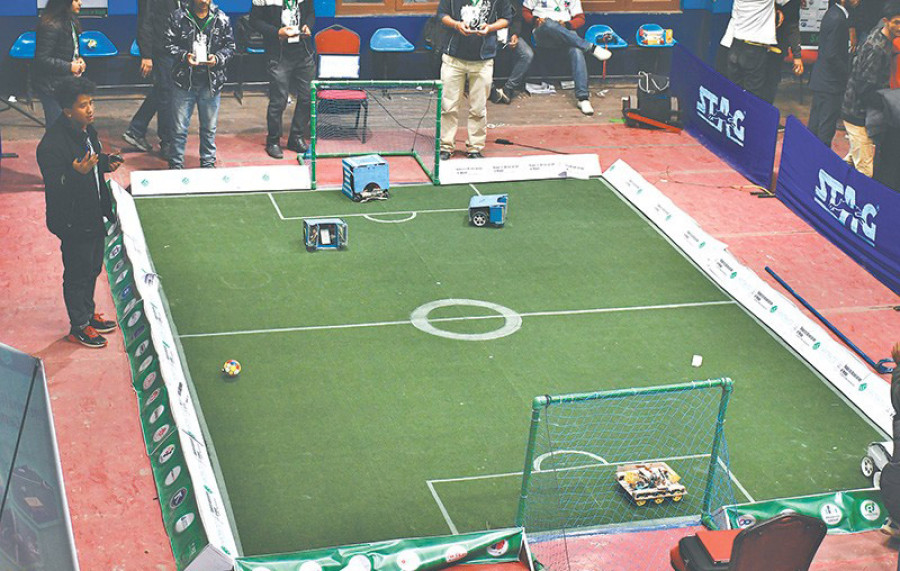Science & Technology
Yantra 7.0 hopes to create a robotics industry in Nepal
Six miniature robots—three black and three striped red-and-white—are placed on the either side of a small green space.
Timothy Aryal
Six miniature robots—three black and three striped red-and-white—are placed on the either side of a small green space. This space, 18 by 12 feet in size, resembles a football ground, with two goal posts and white demarcations. Four young men stand just off the edge of the ground, focussed hard on their phones. They are controlling their robots with their phones.
The referee blows his whistle and a jittery crowd, composed mostly of adolescents and young adults, goes crazy. The black robots, belonging to the United Academy Robotics Club (UARC), look swifter and smaller than the bulky and clumsy-looking robots from Virinchi College. UARC begins its attack but isn’t able to push through Virinchi’s weight.
But by the end of the first minute, UARC, powered by its swiftness and deft handling, scores. UARC scores once more before half-time. The crowd, looking on from the balcony of the covered hall, goes wild. But Virinchi manages to make one point back quickly, and the half-time score stands at 2-1. The six-minute game was as exciting as any full-fledged football game.
The first game of the National League, a robotics football competition, was won by UARC, by four points to two, but it wasn’t an easy win. The League is part of the seventh iteration of Yantra, a science, technology and entrepreneurship festival currently ongoing at the Table Tennis Training Ground in Lainchaur.
Organised by the not-for-profit Robotics Association of Nepal (RAN), Yantra 7.0 is holding a number of such competitions this year, including the RoboBusiness Cup, Yantra Manual Akhada, Yantra Automatic Akhada, along with exhibits such as Yantra Learning and Yantra Kids.
Under the slogan ‘Creating Robotics Industry in Nepal’, this edition of Yantra is focussed on “building an entrepreneurial ecosystem for all robotics lovers, engineers and IT professionals.”
“We’re still roughly five years behind the latest robotics innovations around the world, we’ve made significant strides in the past two years,” said Manoj Lekhak, coordinator of Yantra. “We’ve been improving and as the tagline of this event reads, we want to build a robotics industry in Nepal by 2030.”

RAN has also devised its own tech syllabus for young students, which is currently being taught in half-a-dozen schools around the Valley. The ongoing exhibition features prototypes developed by those students. “We’ve realised that we need to start from the grassroots,” said Lekhak.
The ongoing event has participants from India and Bhutan, which enables Nepali innovators to learn how the devices they’re creating compare to those from neighbouring countries, Lekhak said.
While competitions like National League and Yantra Manual Akhada—a kind of robotics wrestling, where one robot destroys another—are fun and exciting to watch, they do little more than that. The main highlight of the current exhibit, according to Lekhak, is the RoboBusiness Cup, which focuses on creating a platform for the robotics community, entrepreneurs and start-ups.
“Innovative projects and products by participants in RoboBusiness will address local challenges and support the gradual growth of industry, innovation and infrastructure,” said Bikash Gurung, RAN secretary.
The winner of the RoboBusiness competition will be guided through various start-up processes and given incubation time to help them come up with their own product-solving approaches.
“Even now, we already have robots that work in the agro, manufacturing and tourism sectors. We just need to further enhance them,” said Lekhak. “Ultimately, our goal is to produce robots that find local solutions to local problems, but can have a global impact. And we are well on our way.”
Charitra Prajapati, a student of Cosmos College of Science and Management, who was participating in the Manual Akhada, said that he was very happy to showcase his creation among the masses. “I’m really happy and excited and thankful to the event organisers,” Prajapati told the Post just before his robot, CERT, was to take part in the semi-final battle. “It took me about two weeks to create this robot, and I’m happy at how it’s doing in the competition.”
Yantra 7.0 will continue at the Table Tennis Training Ground in Lainchaur until February 21.




 23.51°C Kathmandu
23.51°C Kathmandu











